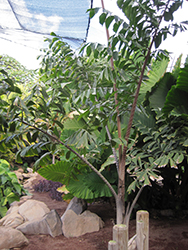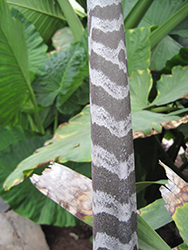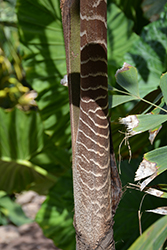Fri & Sat 8am - 8pm
Sun 8am - 7pm
Anytown, USA 12345
fax: 261.787.0463
e-mail: info@successgc.com


Plant Finder

Height: 50 feet
Spread: 30 feet
Sunlight:
![]()
![]()
Hardiness Zone: 9a
Description:
This beautiful rare variety forms a single trunk, topped with large, deep green, pinnate leaves that feature interesting black and white striped stalks; flowers and fruits only once, then dies; provide adequate space; shelter from wind
Ornamental Features
Zebra Fishtail Palm has attractive dark green foliage with hints of black on a tree with the bulk of the canopy held atop a towering trunk or stem. The enormous fan-shaped pinnately compound leaves are highly ornamental and remain dark green throughout the winter. It is draped in stunning clusters of chartreuse flowers hanging below the branches from early to mid summer. The smooth khaki (brownish-green) bark is extremely showy and adds significant winter interest.
Landscape Attributes
Zebra Fishtail Palm is an evergreen tree with a strong central leader and a towering form, with a high canopy of foliage concentrated at the top of the plant. Its relatively coarse texture can be used to stand it apart from other landscape plants with finer foliage.
This tree will require occasional maintenance and upkeep, and should not require much pruning, except when necessary, such as to remove dieback. Gardeners should be aware of the following characteristic(s) that may warrant special consideration;
- Insects
Zebra Fishtail Palm is recommended for the following landscape applications;
- Accent
- Shade
- Vertical Accent
- Container Planting
Planting & Growing
Zebra Fishtail Palm will grow to be about 50 feet tall at maturity, with a spread of 30 feet. It has a high canopy of foliage that sits well above the ground, and should not be planted underneath power lines. As it matures, the lower branches of this tree can be strategically removed to create a high enough canopy to support unobstructed human traffic underneath. It grows at a slow rate, and under ideal conditions can be expected to live for approximately 30 years.
This tree does best in partial shade to shade. It does best in average to evenly moist conditions, but will not tolerate standing water. It is not particular as to soil pH, but grows best in rich soils. It is somewhat tolerant of urban pollution, and will benefit from being planted in a relatively sheltered location. This species is not originally from North America, and parts of it are known to be toxic to humans and animals, so care should be exercised in planting it around children and pets..
Zebra Fishtail Palm is a fine choice for the yard, but it is also a good selection for planting in outdoor pots and containers. Because of its height, it is often used as a 'thriller' in the 'spiller-thriller-filler' container combination; plant it near the center of the pot, surrounded by smaller plants and those that spill over the edges. It is even sizeable enough that it can be grown alone in a suitable container. Note that when grown in a container, it may not perform exactly as indicated on the tag - this is to be expected. Also note that when growing plants in outdoor containers and baskets, they may require more frequent waterings than they would in the yard or garden.


